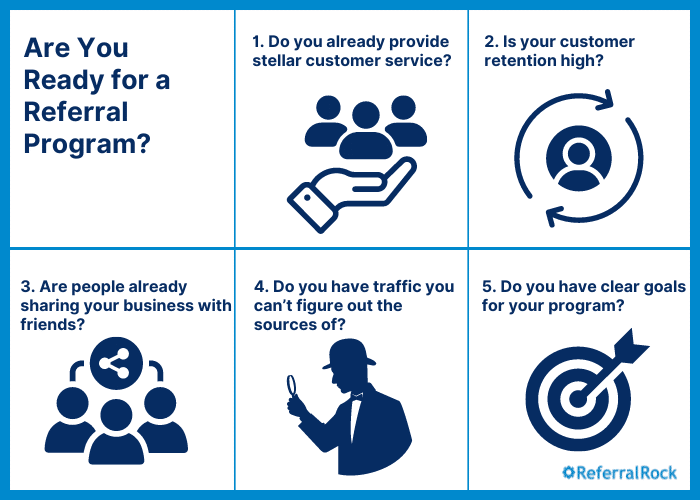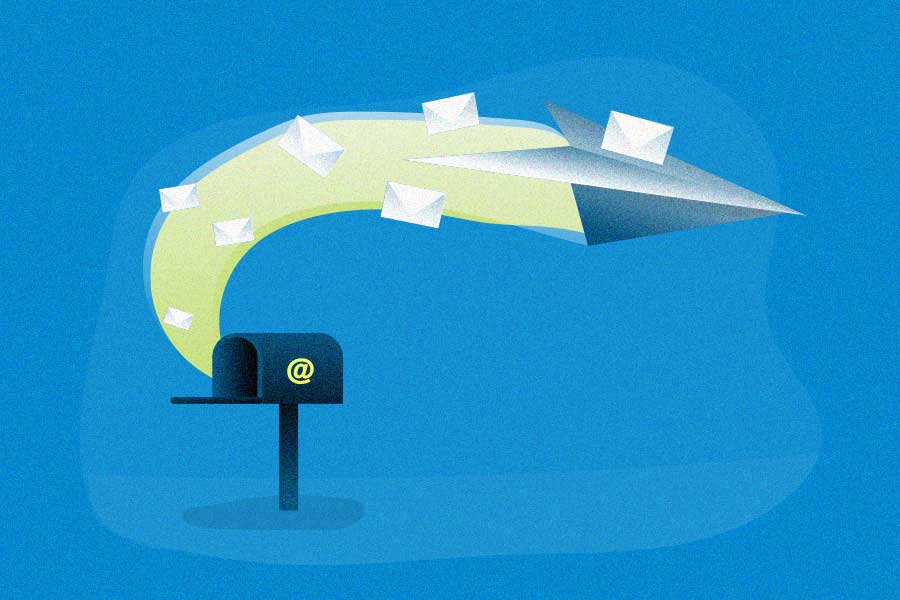So you think you’re ready to get a referral program up and running. But are you ready to launch a referral program? Sure, you may have done some general research and found that referral programs can be super beneficial to a business. But have you actually screened whether your own business can benefit? Here’s how to know if you’re ready to launch a referral program.
Referral programs work best for thriving brands
Referral programs work best for businesses that are already doing well. They are not intended to be a saving grace to mend a broken business. We’re not saying miracles can’t possibly occur – but generally speaking, referral programs are usually more of a supplement to a steady or flourishing business. Think of it as a vitamin or an afternoon cup of coffee.
If your business has seen better days, you might want to first rethink your business strategy before implementing a referral program.
Here’s how to know if your business is referable:
1. You already provide great customer service
Most people know that great customer service is a vital part of any business. It allows you to stand out from competitors, and it keeps customers coming back again and again. It’s a huge factor when it comes to retention (more on that later).
Chances are if you’re providing good customer service, you probably have a big pool of happy customers. Happy customers are more likely to refer your business, and will do so gladly.
If you put effort into providing a positive experience through your brand, customers will be happy to share.
Are you accomplishing the following three things? If so, you probably have excellent customer service.
You give all customers an above-and-beyond experience
You may have great relationships with a few select customers. But, the goal is to make all customers feel good about choosing you over a competitor. Like all good relationships, communication is key. Take the time to have conversations with your customers. Listen to them and respond sincerely.
Consistency is king. So whether you learn everyone’s name, remember their favorite orders, packages, or service requests, be sure to provide a reliably personalized experience to everyone across the board. Strive for customer-centricity in everything you do, and be sure the customer experience you offer has elements that go above and beyond that of your competitors.
Your customers praise you for your customer service
People will let you, and everyone else, know when you are either exceeding expectations or doing something horribly wrong. If you have a ton of glowing reviews online and your customer satisfaction surveys reveal happy customers, you’re probably ready to ask for referrals from these customers.
It’s easy to build customer/partner relationships
Partners notice your relationships with customers, and customers also notice your relationships with partners. But if you have an easy time building those relationships, your business is probably quite referable. There are many ways to build your customer and partner relationships. Communication and customer service go a long way.
2. Your customer retention is soaring
Having a good customer retention rate is the epitome of a sustainable business. If you get paying customers to come back time and time again, you also have a solid chance at getting those customers to refer.
Customer retention often means customer loyalty. Loyal customers not only choose you, but they rave about you to friends. The best part is, they keep choosing you over everyone else.
Besides checking data on retention rate vs. churn rate, here’s how to know if you’re already promoting customer retention:
You provide exceptional products
Providing exceptional products and services is key before creating a referral program. If your offering doesn’t stand out and make an impact, people won’t have any reason to refer you to others – no matter how great your referral program.
It’s important to be passionate about offering exceptional products and services. Otherwise, even the best customer referral program may never take off.
Ask yourself: Do customers genuinely like my products/services? Am I already getting organic word of mouth? Do people leave positive reviews or send me positive feedback?
You reduce their pain points
Are your customers thankful that your product helps them solve a problem or concern? If you can provide something that people need, you’re offering them a solution to one of their pain points. By addressing customer pain points, you become the fix or solution. This then provides a reason for the customer to continually choose you – and eventually, share with friends.
You reciprocate the love
You make your customers want to come back. Coupons, sales, or giving them a little reassurance, can increase your retention. If customers know you appreciate them, they will do what they can to help your business succeed.
3. You already receive organic referrals
If people are already willing to refer you without an incentive, then it’s a pretty clear indicator that you have a referable business.
Word of mouth creates organic referrals. Customers will share your business with others if they have a positive experience. Typically, customers are not shy when it comes to tagging their favorite businesses online. And, when customers share, they are essentially referring your business.
Bonus points if you’re already online, because you’re making it a lot easier for them to share. Things like Facebook recommendations have made it very easy to share and refer businesses. Recommendations from friends have become a fundamental part of searching for local services and businesses. People want their friends’ tried and true input, especially when it comes to paying money for a new service. Which is why review sites and social media platforms are very influential to incoming new customers.
What does it mean to have organic referrals?
You’ve got a stellar review track record
Review sites set you up for referrals. By having your business listed, you build up your credibility. This naturally helps to bring in new customers.
But how do these review sites indicate whether you’re ready for a referral program? Reviews are almost like public referrals, and if someone is willing to rave about you publicly, they’re likely ready to do so in private circles.
Plus, even if a customer personally invites a friend to your business, that person will do their research. If they see an influx of good reviews, you’re golden, no questions asked. Even if you have some negative reviews, it doesn’t necessarily equate to a loss of business because prospects will likely consider if or how you respond to those negative comments.
You’re racking up glowing social comments
Are people sharing about you in their social media posts, or leaving glowing social comments about your amazing products and customer service? Like with reviews, if they’re satisfied enough to give this endorsement publicly, they’ll probably be more than willing to refer you to individual friends.
New customers are “sent” in
You may find that some new customers already say your business was recommended to them by a friend. These are also organic referrals. Customers will send friends for many reasons. It could be that they simply like your business. It could be that you have a specific service that they know their friend needs. Or it could be because you offered great customer service.
Getting these direct referrals? This means the people who sent them will probably be even more willing to share when there’s a reward involved.
4. You have traffic coming in and don’t know where it’s from
Have traffic you can’t trace the source of – often called “dark social” traffic? Somehow your business has entered the vortex of word of mouth travel. This is great because it means people know about you already, thanks to the value you’ve provided.
If you have a good amount of new people coming in, there is a good chance you have a rocking product – and a high chance of running a successful referral program.
Let’s say you have an influx of new traffic or a boost of social media followers. Even if you’re not sure where people are coming from, an influx is good. It means people actually like your business and believe in what you stand for. This is a positive sign, especially if you want to start a referral program. And the good news is, once you do implement a referral program, customers will be inclined to continue referring. You’ll also have a better way of tracking previously “dark” traffic and tracking word of mouth.
5. You know why you want to start a program
Like with any marketing strategy, you need to know why you’d like to start a referral program. This way, you’re best equipped to measure its success if and when you launch. Think through the metrics you’d like to track and the customers you want to attract.
You know your ideal customers
Referral programs are a customer acquisition strategy, so you’ll need to establish the types of customers you want to attract through the program. These customers should be similar to the existing customers you want to make referrals. How will you best motivate these new customers to sign on, and get existing customers to share with people in the right demographics? Think this through before you start to plan a program.
You have clear goals for your program
Why do you want to start a referral program? Aside from more sales, is there anything else you hope to get out of it?
Other goals you might want to set for your program can include:
- Boost customer loyalty (increase customer retention by XX%)
- Build brand awareness (increase website traffic by XX%)
- Drive customer acquisition (increase leads from referrals by XX%)
No matter why you want to start a referral program, it’s important to identify these goals. This allows you to measure how the program is doing, and see whether you’re actually hitting your targets.
The steps to a successful referral program
Referral programs need a bit of planning. They’re not really something that can just be slapped together. Take the time to think about all aspects of the program, so you can craft a well-oiled machine.
Getting to the program launch takes work. That effort is what will make the program a success. If you spent the time to build a business, why not spend a little time building the perfect referral program?
The act of actually creating a program doesn’t take long (especially if you are using software to help you out). The planning and research are the more intensive parts. Once you’ve determined that you’re ready for a referral program, follow these steps to launch one.
Note: This is just a brief overview of the steps. For more, follow the links in each section or consult our guide to building a referral program.
Step 1: Research existing referral programs from similar businesses. What do other referral programs look like in your niche or industry? Here are some good examples.
Step 2: How will you track referrals: manually, or using referral software? Do you know what software is available?
Step 3: Plan your program.
- Are you going to use software to automate your program?
- How will people sign up (i.e., registration page, paper form)?
- How will people find out about the program?
- What types of referral incentives do you want to offer?
- Where will the program live (i.e., standalone site, widget on your website, page on your website)?
- How will you test your program before launching it?
Step 4: Will the referral program you’ve planned return real results? Time to calculate your ROI to determine if and when your referral program will turn a profit.
Step 5: Time to get serious. If you plan on using software, reach out and schedule some demos. Now that you have an idea of what you want your program to be, you can more clearly see how different software can help you reach your vision.
Step 6: Start promoting. Yes, start announcing the program before it’s launched. This way you can get your customers ready, and you can play the field a little bit.
Step 7: Have some coworkers, family, friends, and super customers test your program. This way you can work out the kinks and hear some feedback.
Step 8: Time to launch to all customers. After you are sure your program is in working order, it’s time to launch, baby, launch. Once launched, you have to invite!
Step 9: Your referral program’s up and running, but you’ll still need to promote it regularly so customers don’t forget about it. At the very least, we recommend sending monthly emails to all customers, to remind them of the program.
So, are you ready to launch a referral program?
Too many times we see people start a referral program without taking in essential considerations. Ask yourself these questions before you start a referral program:
- Do we already provide stellar customer service?
- Are we giving all customers a consistent experience?
- Are our customers already referring their friends? (Do we have naturally occurring word-of-mouth marketing?)
- Is the majority of our customer feedback positive?
Remember, there are factors that could lead to program failure. Whether it’s unrealistic expectations, or you just don’t have happy customers, there are reasons why referral programs fail. If you can steer clear of these, and you are able to answer the questions above with a “yes,” you are probably in the ballpark for adding a referral program.





